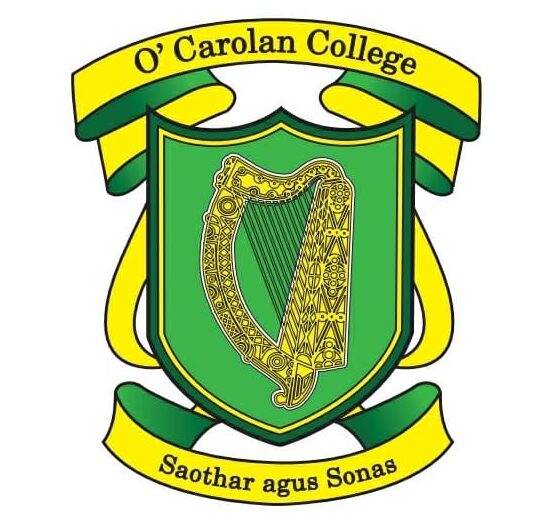Maths
Department members:
Alana Carolan, Claire Smith, Clodagh Monaghan, Donna-Marie Brennan, Eoin Power, Lauren Reilly, Marie O’Connor, Mary Tighe, Megan Brady, Hannah Kealy, Ryan Carry and Nicola Mc Connell.
Department Co-ordinators:
Donna-Marie Brennan
Mathematics Learning Support Team:
Fiona Crosby & Claire Smith.
Numeracy:
At O’ Carolan College we believe the development of numeracy skills is a basic entitlement for all. All students should experience a rich numeracy learning environment, regardless of perceived ‘ability’. Numeracy involves the application of knowledge, skills and understanding, essential for personal and social development and for life-long learning.
Provision of the Subject in the School:
Maths is taught to all years from First to Sixth Year as per the DES Syllabus and Guidelines, with ‘Mathematical Applications’ taught to Leaving Certificate Applied students. Learning support is available, where appropriate, from the learning support team and ‘Applied Mathematics’ as an additional subject is available to Leaving Certificate students in fifth and sixth year. (See Applied Mathematics report).
Timetabling:
First Year – 4 classes a week
Second Year – 5 classes a week
Third Year – 5 classes a week
TY – 2/3 classes a week
Fifth Years – 5 classes a week. Higher level students also have an additional class one evening a week after school for the duration of Fifth Year.
Sixth Years – 5 classes a week. Higher level students also have an additional class one evening a week after school for the duration of Sixth Year.
The subject is taught at Higher and Ordinary level to both Junior and Leaving Certificate classes.
Planning and Preparation:
Department meetings were formally held and minuted regularly throughout the year. These meetings were used to discuss department planning, allocation of classes, review programmes of work particularly first year maths, organise Maths Week events, record results and expected results, arrange Christmas and Summer tests, prepare marking schemes and discuss textbooks.
Informally we discussed department matters daily.
ICT and Maths/ Resources:
Each Maths classroom has a PC, projector and visualiser, with all department members having access to a graphics tablets. Geogebra software has been installed on all PCs in OCC.
Students have full access in school and at home to Microsoft Teams, which class teachers keep regularly updated with ongoing classwork and resources for all students. All junior students now have their own ‘show-me’ board which are used regularly in class as a valuable teaching aid. 3rd year and 6th Year students have access to Studyclix; an online bank of past exam questions with solutions.
Assessment:
Assessment includes homework and class tests, with class tests being given regularly, typically at the end of each section. In-class assessment using show-me boards is also a valuable teaching methodology, with all junior students having their own board.
First & Second Years sit a one hour exam at Christmas and summer.
Fifth Years sit a 1 hour & 20 minute exam at Christmas and summer.
Informal and formative assessment occurs in class on an ongoing basis, which allows students to assess their progress.
Extra-curricular Mathematics:
OCC’s Maths Department encourage our students to become involved in a number of fun activities during the school year, with the goal of enhancing learning and of increasing their enjoyment of the subject.
Maths eyes
This year students had the opportunity to take part in the competition “Have you got Math’s Eyes”. This was an initiative to help students see that Maths just doesn’t happen in the classroom but is everywhere around us. As part of the competition students had to submit a photo that captured some aspect of real-life mathematics and involved a mathematical question. It was open to both Senior and Junior students and we had some amazing entries. The winner was Noah Wall in 2nd year and runner up was Gemma Quinn also 2nd year. Well done to all participants.
First year treasure hunt
The first years enjoyed doing a treasure hunt around the school solving problems and then using a co ordinate grid of the school to find letters that they had to spell out the word reciprocal. Well, done to all the winners.
Drop everything and problem solve
A new initiative that took place this year was for 20 minutes during maths week the entire school stopped what they were doing, and problem solved. 2 NíConchobhair and 5th year computer science class solved all 4 puzzles.
CTYI puzzle of the day
Thanks to Ms. Dempsey for providing a maths puzzle of the day. The winner was Alan Stafford from first year and Noah Wall second year.
In-service/Staff Development:
Alana Carolan,Donna-Marie Brennan, Lauren Reilly attended Chat GTP for maths teachers Drumcondra education center online October 5th.
JCT cluster day for maths March 4th was attended by Alana Carolan, Donna-Marie Brennan, Lauren Reilly.
Lauren Reilly attended the following; Overcoming Algebra Fatigue in the Leaving Certificate Classroom Nov 15th. The Power is in Their Prior Knowledge When Teaching Functions Effectively & Efficiently Jan 29th ,Maximising maths Outcomes: Leveraging CBAs for Student Success Jan 30th.
Donna-Marie Brennan and Lauren Reilly attended Leaving cert Probability course over 22&29 February, 14&21 March.
